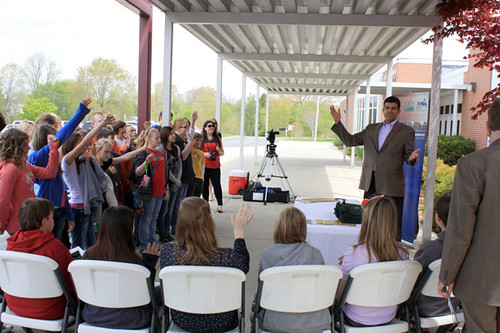
“How many of you like to swim in the creek or fish in the river?”, USDA Rural Utilities Service Administrator John Padalino asked White County Middle School students during the school’s Earth Day awards ceremony.
Do you like to go swimming or fishing? Rivers and lakes are cleaner thanks to USDA water/sewer investments in rural communities.
On Monday, I joined Earth Day celebrations in the rural communities of Sparta and Monterey, Tenn. Part of being good stewards of the Earth and our natural resources is making sure that we take proper care of waste and wastewater disposal. The stories from Sparta and Monterey show how important this is.
At the White County Middle School in Sparta, children recognized Earth Day by planting trees to help the environment. The celebration also marked the end of a major sewage problem in town.
Principal Craig Lynn told me how, about 10 years ago, students and teachers started noticing the football field was still mushy long after a rain. Antiquated sewer equipment couldn’t keep up with rainwater runoff anymore, and sewage was overflowing out of drains and manhole covers all over the city. “It just got real obvious down on the field where so many students practice and play,” Lynn said.
Sparta Mayor Jeff Young added, “It’s not easy to fix something this big, especially when no new customers are being added to increase revenue. USDA helped us figure out the best solution and how to pay for in a way we could afford.”
“Selling bonds or raising taxes is not usually an option for small towns when something big goes wrong,” he continued “Private lenders sometimes can’t help with infrastructure, so having USDA as a partner is crucial when it comes to basic public services.”
Tennessee’s Upper Cumberland region has some of the largest stretches of contiguous forestland in the eastern U.S., along with dramatic gorges, lakes and rivers. The near pristine condition of the natural environment is one of this region’s most valuable economic resources. The USDA financing has had a positive impact on the local environment and economy. Dependable water and sewer have had an immediate impact on the quality of life for families and make it possible for local businesses to grow good jobs.
Next, I went to nearby Monterey for Earth Day to celebrate the extension of its water system. “The smell of fresh water is wonderful,” local resident Shannon Davis said. She told me about how for 15 years her family had to haul water in jugs from her parents’ house for drinking and cooking. “To say getting public water is a blessing is an understatement.”
USDA financing made it affordable for the town of 2,800 to extend water service another five miles out into the Walker Hollow area of Putnam County where the Davis family lives. The Davises and others in Walker Hollow had been using individual water wells that became unsafe due to iron, manganese and coliform bacteria in the water supply. The water got contaminated because of changes in the water table from recurring droughts and pressures created by growth. The city made it a priority to get service to households in that area.
“Before public water, we spent over $15,000 to repair and replace appliances,” Davis said. “The sulfur water ruined refrigerators, a dishwasher and our other appliances with electric coils. “There are not enough adjectives to express how much getting public water means to my family.”

USDA Rural Utilities Service Administrator John Padalino and White County Middle School students and teachers added three oaks and two pawpaw trees to the school’s tree park to mark Earth Day.
No comments:
Post a Comment
Note: Only a member of this blog may post a comment.